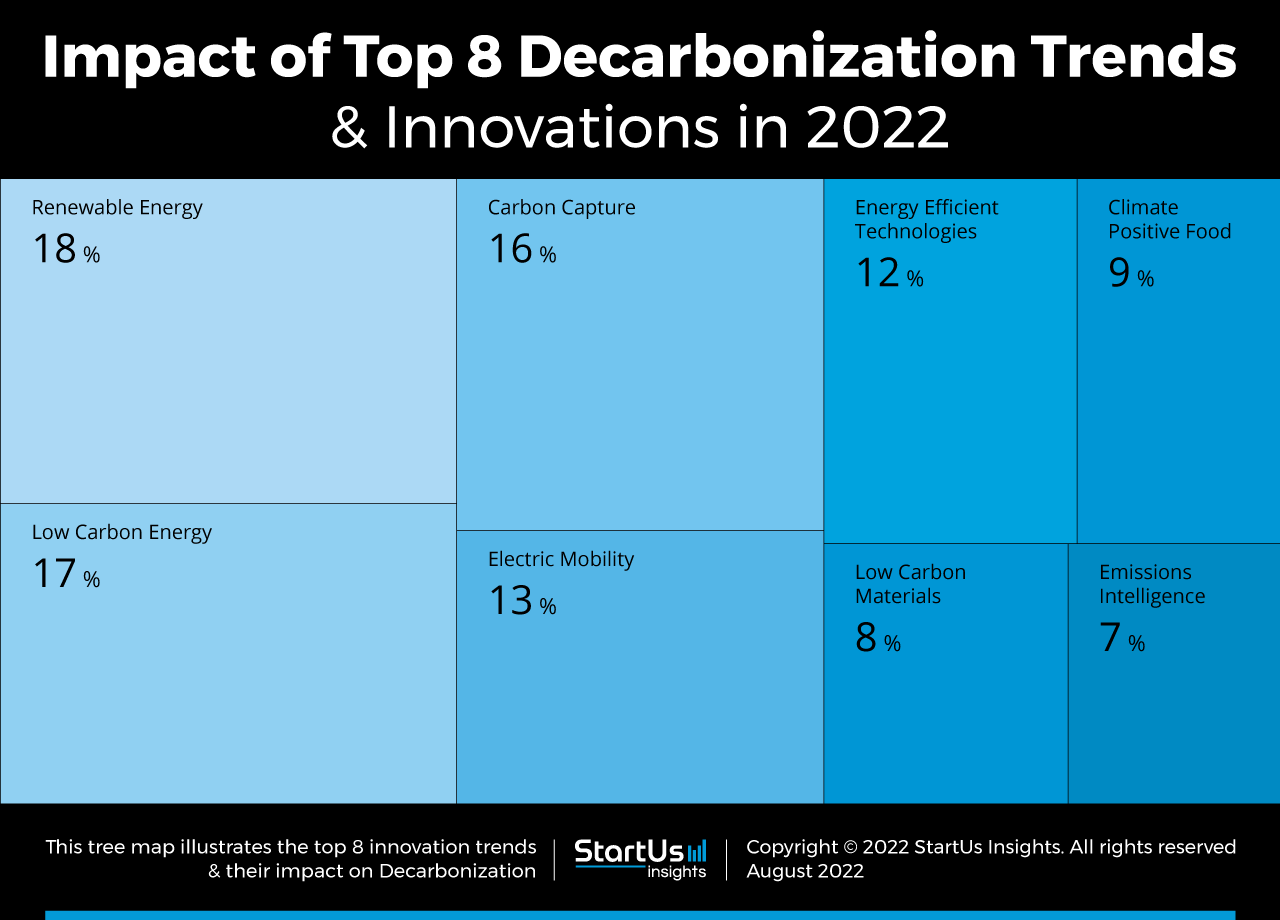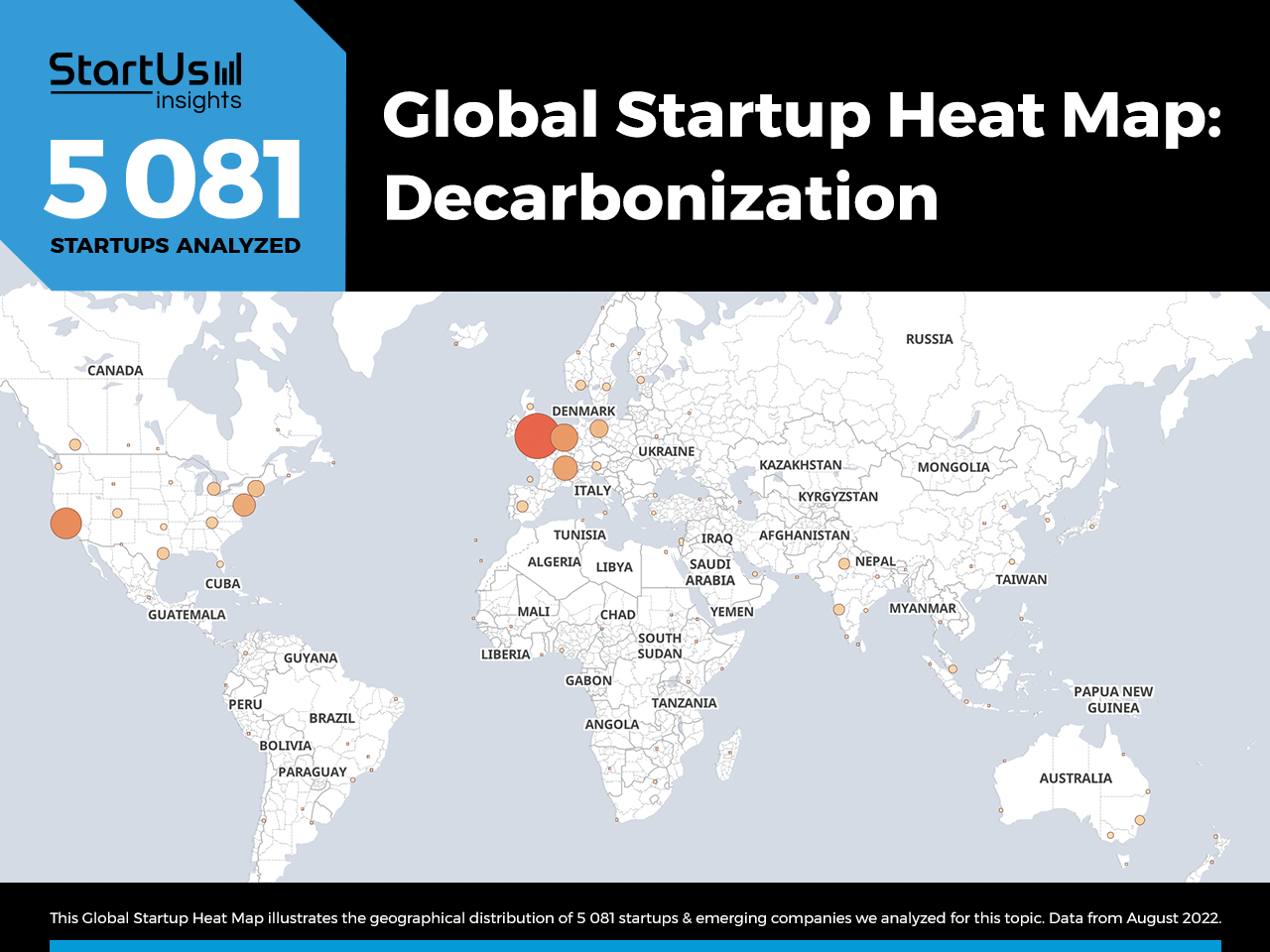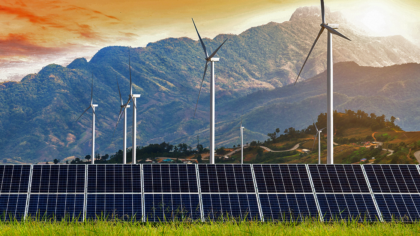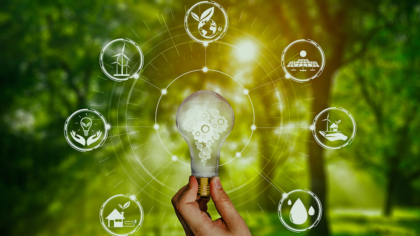To avoid the catastrophic effects of climate change, industries cut their carbon emissions to achieve net zero goals. Here, we present the leading decarbonization trends for 2025 to help you enhance your sustainability initiatives. Topping the list are renewable and low-carbon energy solutions, alongside advanced carbon capture technologies. The construction industry increasingly adopts low-carbon materials, while the food industry advances with plant-based and lab-grown meat alternatives to lower its carbon footprint. Continue reading to explore all the innovative decarbonization technologies and top trends.
This article was last updated in July 2024.
Innovation Map outlines the Top 8 Decarbonization Trends & 16 Promising Startups
For this in-depth research on the top global decarbonization trends and startups, we analyzed a sample of 5081 global startups & scaleups. This data-driven research provides innovation intelligence that helps you improve strategic decision-making by giving you an overview of emerging technologies and trends in the decarbonization industry. In the Decarbonization Innovation Map, you get a comprehensive overview of the innovation trends & startups that impact your company.
Top 8 Decarbonization Trends in 2025
- Renewable Energy
- Low Carbon Energy
- Carbon Capture
- Electric Mobility
- Energy Efficient Technologies
- Climate Positive Food
- Low Carbon Materials
- Emissions Intelligence
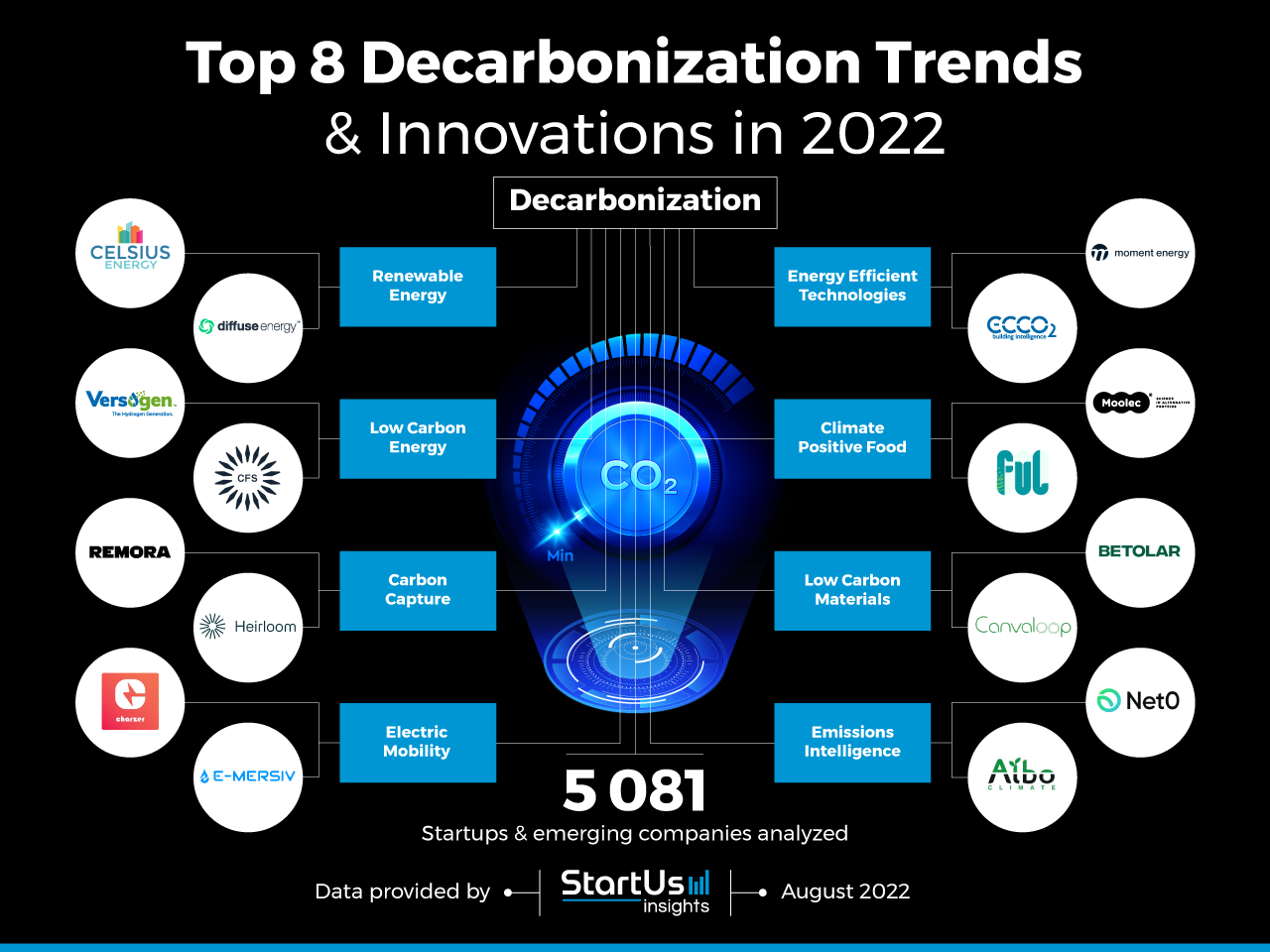
Want to explore all 5080+ decarbonization startups & scaleups?
These insights are derived by working with our Big Data & Artificial Intelligence-powered StartUs Insights Discovery Platform, covering 4.7M+ startups & scaleups globally. As the world’s largest resource for data on emerging companies, the SaaS platform enables you to identify relevant technologies and industry trends quickly & exhaustively.
Tree Map reveals the Impact of the Top 8 Decarbonization Trends
Based on the Decarbonization Innovation Map, the Tree Map below illustrates the impact of the Top 8 Decarbonization Trends in 2025. Reducing dependence on fossil fuels is imperative for decarbonization. Since the energy sector is responsible for the majority of the carbon emissions, one of the major decarbonization efforts is transitioning towards renewable and low carbon alternatives like wind power, geothermal energy, and hydrogen. Further, advances in carbon capture technologies, including direct air capture (DAC), curb emissions away from the source as well.
Startups are providing innovative solutions that support the large-scale adoption of electric vehicles (EVs) to decarbonize the mobility sector. On the other hand, climate positive food replaces resource-intensive farming practices to cut down agricultural emissions. For example, it is substituting carbon-intensive animal meat with alternative proteins. Apart from these, the top trends include advancements in energy efficient technologies, low carbon materials, and AI-powered emissions intelligence.
Global Startup Heat Map covers 5081 Decarbonization Startups & Scaleups
The Global Startup Heat Map below highlights the global distribution of the 5081 exemplary startups & scaleups that we analyzed for this research. Created through the StartUs Insights Discovery Platform, the Heat Map reveals that the UK has a high concentration of decarbonization startups, followed by the US and other Western European countries.
Below, you get to meet 16 out of these 5081 promising startups & scaleups as well as the solutions they develop. These decarbonization startups are hand-picked based on criteria such as founding year, location, funding raised, and more. Depending on your specific needs, your top picks might look entirely different.
Top 8 Decarbonization Trends for 2025
1. Renewable Energy
Most of the anthropogenic CO2 emissions arise from burning fossil fuels such as coal, natural gas, and petroleum, for energy sourcing. As a result, utilities and energy providers are promoting energy transition. They are shifting to renewable energies to improve sustainability and leverage the benefits of renewable energy. Startups are working on emerging technologies to accelerate the global transition towards renewable energy.
Some of the renewable energy systems include advanced photovoltaics (PV) that capture solar energy more efficiently and wind turbines that eliminate the need for huge installations or high-low wind speeds. Additionally, companies are making significant innovations in the areas of hydroelectricity, geothermal energy, and biofuels.
Celsius Energy optimizes Geothermal Energy Production
Celsius Energy is a French startup that uses geothermal energy for heating and air conditioning buildings. It uses a heat transfer fluid that circulates in a 200-meter-deep heat exchanger. A heat pump then exchanges the calories with the basement to supply heat to the building during winter and extract them in summer.
Additionally, a digital control system minimizes electricity consumption by optimizing subsurface operations and heat pumps in real time. Thus, Celsius Energy allows commercial buildings to reduce their dependence on fossil fuels by utilizing a local renewable source of energy.
COLIPI ferments Renewable Carbon
German startup COLIPI produces Climate Oil by fermenting renewable carbon from organic byproducts and CO2 from point sources. Using microbial yeasts and hydrogen-oxidizing bacteria, COLIPI harnesses biogenic carbon dioxide and industrial byproducts. Its patented gas fermentation bioreactor enhances carbon conversion efficiency. The power-to-liquid technology lowers production costs and supports climate-neutral biomaterials. Climate Oil acts as a sustainable alternative to traditional vegetable oils, suitable for cosmetics and surfactants, through yeast precision fermentation. Additionally, bacterial gas fermentation enables the creation of sustainable aviation fuels and bioplastics.
2. Low Carbon Energy
Emerging low carbon energy sources like hydrogen and nuclear power are also in demand to tackle climate change. Although blue hydrogen is not completely carbon-neutral, it is still better than fossil fuels as the CO2 generated in the production process is stored and captured. The primary focus is on green hydrogen, which is generated using renewable energy.
Startups are developing advanced electrolyzers and exchange membranes to make hydrogen production affordable and sustainable. Coming to nuclear energy, small modular reactors (SMRs) are easier to build than traditional reactors. Energy-efficient nuclear fusion solutions will also enable the large-scale generation of affordable clean energy.
Versogen offers Low-Cost Green Hydrogen
Versogen is a US-based startup that creates an electrolyzer for low-cost green hydrogen production. Its proprietary platform technology, PiperION, applies advanced anion exchange membranes that enable the use of low-cost construction materials in electrolyzers, fuel cells, and other electrochemical devices. This makes them more economical than conventional proton exchange membranes (PEMs). Hence, Versogen solves the main challenge in large-scale green hydrogen production and accelerates the global transition toward net zero.
Commonwealth Fusion Systems advances Nuclear Fusion Energy
US-based startup Commonwealth Fusion Systems builds SPARC, an advanced nuclear fusion device. It produces plasmas that generate more energy than they consume. SPARC generates carbon-free, safe, and limitless fusion power utilizing compact high-field tokamak and high-temperature superconductor (HTS) magnets.
Additionally, the startup is constructing its own commercial nuclear fusion plant, ARC. This way, Commonwealth Fusion Systems is providing an economically viable and clean energy source.
3. Carbon Capture
While renewables and low carbon energy sources are critical in the fight against climate change, they alone are not enough to reverse the effects of global warming. Hence, startups are working on carbon capture, utilization, and storage (CCUS) technologies, driving decarbonization across industries.
The top priority is direct air capture, i.e., capturing CO2 directly from ambient air instead of point sources such as power plants or factories. This opens up concentrated opportunities for carbon sequestration and utilization. Additionally, among carbon capture and sequestration at point sources, carbon capture and storage solutions tailored for vehicles are on the rise.
Remora drives Vehicular Emissions Reduction
Remora is a US-based startup that develops a retrofit carbon capture unit for semi-trucks. The device attaches to the vehicle exhaust pipe and captures up to 80% of total emissions. It uses carbon scrubbing technology to strip greenhouse gases from the tailpipe and release clean air.
Moreover, the solution automatically compresses the CO2 and stores it in onboard tanks. Once the offload tanks fill up, the startup picks up the CO2 with a tanker truck and delivers it to concrete producers or other end-users who store it away for a long time. This way, Remora enables vehicular emissions reduction as well as improves sustainability downstream.
Heirloom advances Direct Air Capture
US-based startup Heirloom develops a cost-effective direct air capture solution. It deploys carbon mineralization technology with widely available, low-cost minerals to produce oxides that naturally bind to CO. The process doesn’t rely on energy-intensive and high-cost air contactors.
Heirloom injects the captured carbon underground into geological structures. There, it remains permanently trapped away from the atmosphere. Additionally, Heirloom implements a looping process that recycles minerals to limit its reliance on mining, reducing its overall resource usage. The startup, in turn, enables organizations across various industries to reduce their environmental impact.
4. Electric Mobility
Mobility is one of the largest carbon-emitting sectors and the most efficient way to decarbonize the industry is electrification. While battery electric vehicles (BEVs) have been here for some time, fuel cell electric vehicles (FCEVs) are emerging to be more effective. This is because they are powered by hydrogen and emit only water vapor and warm air.
However, even with BEVs, widespread usage is still a challenge due to the non-availability of EV charging stations and range anxiety. To resolve this, startups are developing EV charging station networks as well as modular charging solutions. Besides, they are continuously innovating to make EV batteries more energy-efficient and safe.
Charzer builds IoT-Powered EV Charging Station
Indian startup Charzer provides Kirana Charzer, a low-cost, compact, IoT-powered EV charging station. It is installable in shops, restaurants, houses, and offices, among others. The startup also offers a mobile app that allows riders to locate the nearest charging point and book slots from a network of 300+ charging stations across India. By converting local groceries, malls, and even small tea shops into EV charging stations, Charzer creates a vast charging network for EV riders, accelerating EV adoption.
Everfuel delivers Green Hydrogen
Danish startup Everfuel offers green hydrogen supply and fueling solutions. The system produces hydrogen using renewable electricity only during the availability of surplus energy to reduce energy costs. This approach also provides the power grid with efficient energy storage and enhances the efficiency of renewable energy production. Everfuel connects vehicle manufacturers to the complete hydrogen value chain, ensuring a supply of clean hydrogen fuel to their customers.
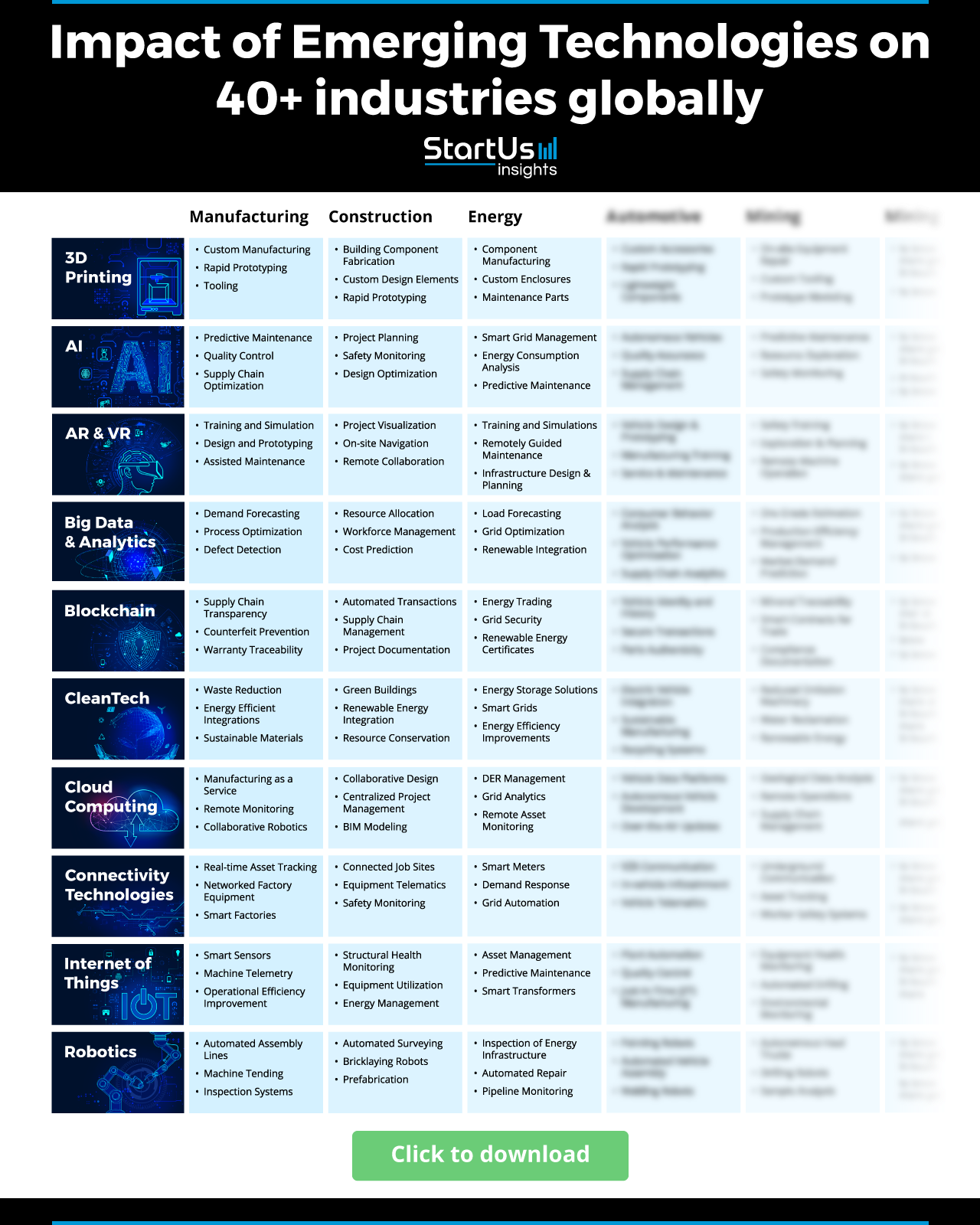
5. Energy Efficient Technologies
Using energy efficiently is as important as looking for sustainable ways to generate it. As a result, energy-efficient technologies are one of the top decarbonization trends. Energy storage, especially renewable energy storage is one of the focus areas. Startups are building innovative renewable energy storage solutions to prevent losses during energy storage and transmission.
Energy consumption management is another important aspect to reduce carbon emissions. That is why many startups offer energy management solutions for apartments and industrial setups. They track the energy requirement of the buildings using digital twins and adjust the energy settings accordingly, enabling the users to save electricity and reduce their carbon footprint.
Moment Energy enables Renewable Energy Storage
Moment Energy is a Canadian cleantech startup that repurposes retired EV batteries. The startup’s commercial energy storage systems (ESS) allow commercial and industrial facilities to significantly cut down utility costs and reduce CO2 emissions through peak shaving and power backup. Whereas, off-grid facilities like mining sites and fisheries use them to reduce diesel consumption.
Finally, Moment Energy enables utility companies to provide clean and stable electricity to their consumers despite the intermittency of energy generation, while efficiently managing peak energy demand.
ECCO2 optimizes Building Energy Management
Swiss startup ECCO2 provides a digital twin-based building energy management solution. The startup’s web-based software, Cumulus Cloud, allows consumers to monitor and optimize building energy consumption. Various Internet of Things (IoT) sensors collect real-time data regarding temperature, humidity, air quality, and CO2 emissions by the heating systems.
The startup’s artificial intelligence (AI) engine then analyzes this data to calculate building energy requirements and optimizes the digital twin. This way, ECCO2 minimizes energy consumption, while offering predictive heating control and environmental, social, and governance (ESG) reporting.
6. Climate Positive Food
Animal meat accounts for the majority of the CO2 emissions in the food production industry. But, the demand for meat is only going upward. This is why food tech startups are constantly looking for alternative protein sources including plant products like soybean, pea, chickpea, and nuts, as well as fungi and insects.
Moreover, some startups are genetically modifying plants to mimic the taste and texture of animal meat while retaining the original nutritional qualities. While these startups are enabling the food sector to achieve carbon neutrality, others are taking it a step forward by leveraging food ingredients like spirulina, which naturally captures CO2.
Moolec offers Plant-Based Alternative Proteins
UK-based startup Moolec creates plant-based alternative proteins through molecular farming. The startup’s process induces animal proteins’ gene DNA codes inside the genome of plants to produce proteins the way animals do.
Each protein is selected to add value in terms of targeted functionality like taste, texture, and nutritional values. Thus, Moolec is enabling the food sector to reduce its reliance on animal-based meat and, thereby, decrease its carbon footprint.
FUL formulates a Climate Positive Drink
Dutch startup FUL offers climate positive drinks with spirulina, nutritious blue-green algae. This superfood is climate-friendly as it captures atmospheric CO2 and converts it into oxygen and nitrogen. Moreover, the startup enables CO2 recycling by using carbon dioxide to grow spirulina. FUL is thus decarbonizing the food and beverage industry by flipping the tradition of emitting CO2 in the production process.
7. Low Carbon Materials
There is a huge scope for decarbonization if industries are conscious of the kind of materials they use. For example, the construction industry deals with various resource-intensive building materials. They include cement, asbestos, vinyl flooring, and polystyrene insulations that are highly toxic to the environment.
Low carbon construction materials such as self-healing concrete, 3D graphene, aerographite, modular bamboo, and wool bricks are gaining popularity as sustainable alternatives. Additionally, the fashion industry is reducing its carbon footprint by recycling and upcycling old garments. To level it up, some startups are using crops like hemp that naturally capture CO2.
Betolar provides a Cement Alternative
Betolar is a Finnish startup that makes Geoprime, a sustainable cement alternative. It is a geopolymer-based low carbon material that the startup uses to create cement-free construction materials. To further sustainability, Betolar utilizes side streams of energy, steel, paper, pulp, and mining industries to produce these construction materials including stabilization, precast, and ready-mix concrete. By providing low carbon materials, Betolar enables the construction industry’s transition to carbon neutrality.
Canvaloop makes a Carbon Negative Textile Fiber
Indian startup Canvaloop produces a carbon-negative textile fiber for slow fashion. The startup’s proprietary technology converts hard barks of Himalayan hemp into a soft cotton-like form. It is then processed into sustainable fiber, HempLoop+.
Besides selling fiber and yarns, the startup uses its fiber to make sustainable jeans, yoga mats, and masks that are plastic-free and prevent the release of microplastics in the wastewater stream. Hence, by using a crop that naturally captures CO2, Canvaloop enables decarbonization in the fashion industry.
8. Emissions Intelligence
To control carbon emissions, we must be able to track them. This is where emissions intelligence plays a big role in decarbonization. Startups are leveraging AI to build carbon emission tracking software for organizations to monitor their CO2 emissions.
These solutions analyze organizational carbon footprint, suggest ways to reduce it, as well as provide them with opportunities to fund environmental projects and earn carbon neutrality certificates. Other startups are deploying deep learning algorithms to advance carbon sequestration monitoring.
Net0 develops a Carbon Accounting Platform
UK-based startup Net0 builds an AI-powered carbon accounting platform. It captures raw data from invoices, enterprise resource planning (ERP) systems, and other integrations and automatically converts them into CO2 emissions metrics. Companies set targets and track performance against benchmarks to achieve their climate goals.
Moreover, the startup’s AI-powered simulation predicts the impact of business changes on the carbon footprint. Net0, thus, enables businesses to measure, reduce, and report on their carbon emissions, as well as receive carbon neutrality certificates to meet their ESG goals.
Albo Climate advances Carbon Sequestration Monitoring
Israeli startup Albo Climate enables carbon sequestration monitoring. It scans selected areas with satellite imagery. Then, the startup’s proprietary deep learning algorithms map, measure, and monitor carbon sequestration and carbon productivity in nature-based projects. This way, Albo Climate is advancing the carbon credit market by making carbon removal scalable.
Discover all Decarbonization Trends, Technologies & Startups
Beyond the above-mentioned decarbonization technologies and trends, advanced waste management is crucial for managing the increasing carbon emissions from waste streams and landfills. 5G has the potential to accelerate global efforts to cut down CO2 emissions.
Carbon-intensive industries such as energy, manufacturing, and transport will soon leverage 5G to optimize their systems to reduce resource consumption. Across industries, solutions to increase operational efficiency and improve data sharing throughout the supply chain will further drive decarbonization.
The Decarbonization Trends & Startups outlined in this report only scratch the surface of trends that we identified during our data-driven innovation and startup scouting process. Among others, climate-positive efforts, renewables, AI, and CCUS will transform the sector as we know it today.
Identifying new opportunities and emerging technologies to implement into your business goes a long way in gaining a competitive advantage. Get in touch to easily and exhaustively scout startups, technologies & trends that matter to you!


